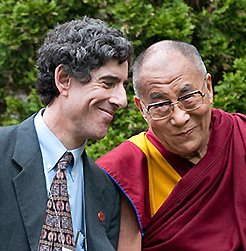
The Dalai Lama recently challenged Professor Davidson
‘You’ve been using the tools of modern neuroscience to mostly study anxiety, depression and fear, all these negative feelings. Why can’t you use these same tools to study qualities like kindness and compassion and equanimity?’ And I didn’t have a very good answer for him. It was a total wake-up call for me and really was a pivotal catalyst.”
So this is what Professor Davidson has been doing ever since. Which has lead to an emerging field called contemplative neuroscience.
How do practices like mindfulness, mediation and compassion training influence the mind, biology and actions of its practioners? And are we innately good, bad or neutral?
Neuroplasticity
The foundation for growth is in the brains ability to change its structure and function. The brain is the organ that changes in response to experience and in response to mental training. The average human brain grows 5,000-10,000 new neurons everyday (called neurogenesis) and those are integrated in existing circuits that play an important role in our higher mental functions.
Stress has a negative effect on neurogenesis (we don’t know if contemplative practises, like mindfulness, stimulate neurogenesis but its certainly a reasonable hypothesis).
Epigenetics
Our genes are not quite as fixed as we once thought they were. We are all born with a fixed complement of DNA and these base pair don’t change their sequence – but what does vary dynamically is which genes are turned on or turned off.
We can think of genes as having volume controls which regulates the extent to which the genes are expressed and these are highly dynamic and highly influenced by our behaviour, environment and likely by our demeanour and by our comportment.
Bidirectional communication between mind/brain and body
There are massive bi-directional pathways between the mind and the body – so circuits in the brain that are important for regulating attention and regulating emotion talk to peripheral biology – they talk to the body and they influence the body.
Correspondingly the body will continuously influence and bathe the brain in feedback and this is a bi-directional highway, this is highly dynamic and plays a very important role in our well being.
This is why working directly on the body can have a highly influential effect on the mind and its also why happiness and unhappiness are associated with different health outcomes, because the circuits in the brain that are associated with our emotions very much influence the body in ways that impact health.
Innate basic goodness
This is very new in terms of hard nosed research, but this is a theme that I will claim that there is now very, very good scientific evidence that we are born with an innate bias for goodness. 6 month old infants have a preference for looking at, and for attending to, altruistic encounters compared to encounters that are competitive or antagonistic.
It's not just humans but recent evidence suggests that some non human primates have this innate bias as well.
It's not to say that aggression can’t be found early on but that if you give an organism a choice it will choose altruism over competition it will choose cooperation over hindrance. And this has been clearly shown in very young infants.
2 weeks of compassion training cause people to act more altruistically.
Just 2 weeks at 30 mins training a day, so only 7 hours of training, cause more altruistic behaviour in hard nosed economic decision making tasks. The extent to which the brain changed actually predicates the extent to which people behaved altruistically.
This is a summary of the first part of the talk by Professor Richard Davidson below.
(any earnings from this article above will be donated to Professor Davidson's centre)
Hi! I am a content-detection robot. This post is to help manual curators; I have NOT flagged you.
Here is similar content:
https://steemit.com/science/@darrantrute/professor-richard-davidson-says-the-dalai-lama-gave-him-a-profound-wake-up-call
Downvoting a post can decrease pending rewards and make it less visible. Common reasons:
Submit
basically I don't know what I was doing! It is repeat content. Sorry about that.
Downvoting a post can decrease pending rewards and make it less visible. Common reasons:
Submit